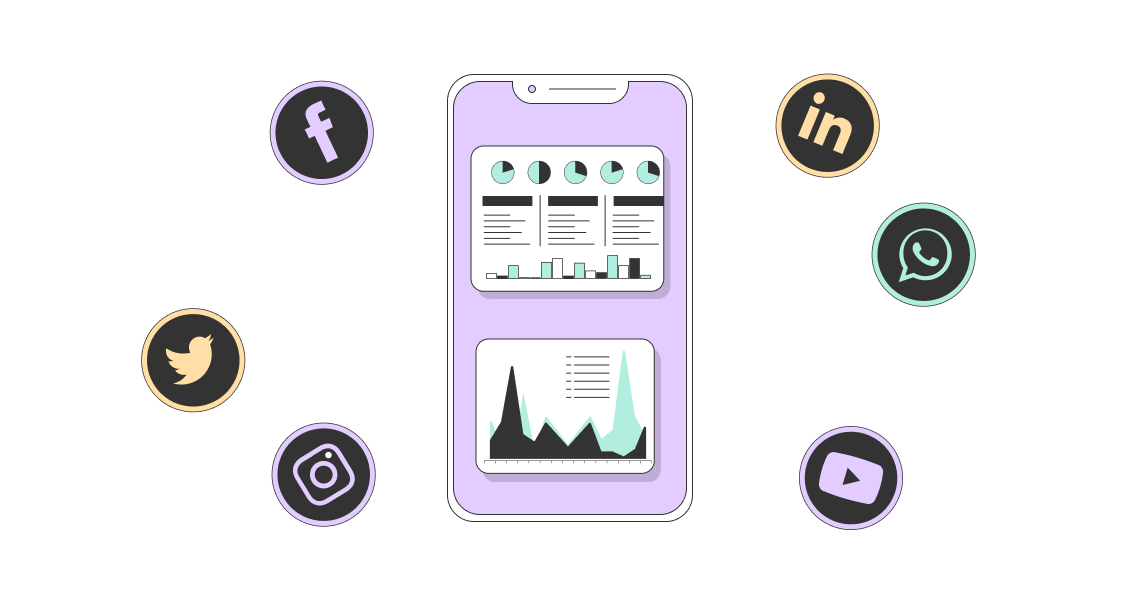In today’s digital age, where social media platforms and online communities thrive, businesses have a valuable opportunity to gain insights into consumer preferences, trends, and sentiments. This process, known as digital social listening, enables companies to monitor, analyze, and respond to conversations happening online. In this article, we will explore the concept of digital social listening, its importance, and how it can be leveraged to drive business success.
Understanding Digital Social Listening

Digital social listening refers to the practice of monitoring and analyzing online conversations across various social media platforms, websites, forums, and blogs. It involves capturing and interpreting user-generated content, such as comments, reviews, mentions, and hashtags. By actively listening to what people are saying, businesses can gain valuable insights into consumer preferences, opinions, trends, and brand perception.
Key Components of Digital Social Listening
1. Data Collection
At the heart of digital social listening is data collection. This involves gathering data from various social media platforms, blogs, forums, and other online channels. The more comprehensive the data, the better the insights.
2. Data Analysis
Once data is collected, the next step is analysis. This involves categorizing and interpreting the data to uncover patterns, trends, and sentiments. Advanced algorithms and machine learning play a crucial role in making sense of the vast amounts of information.
3. Reporting and Insights
The final component is reporting. This is where the insights are compiled into actionable reports. These reports can help guide marketing strategies, product development, and customer service improvements.
How Digital Social Listening Works
1. Tools and Platforms
There are several tools and platforms available for digital social listening. Some of the most popular include Brandwatch, AIM Insights, Sprout Social, and Mention.
2. Step-by-Step Process
Setting Objectives
The first step in social listening is setting clear objectives. What do you want to achieve? Whether it’s improving customer satisfaction, tracking a campaign, or monitoring a crisis, having clear goals is essential.
Collecting Data
Next, data is collected from various online sources. This includes social media platforms, blogs, news sites, and forums.
Analyzing Data
Once the data is collected, it’s analyzed to identify patterns and trends. This is where advanced analytics and machine learning come into play.
Reporting
Finally, the insights are compiled into reports. These reports should be actionable, providing clear recommendations based on the data.
The Benefits of Digital Social Listening
- Real-Time Insights: Digital social listening allows businesses to tap into real-time conversations, keeping them informed about the latest trends, news, and consumer sentiments. This helps in making agile and data-driven decisions.
- Customer Understanding: By monitoring online conversations, businesses can gain a deeper understanding of their target audience. They can identify pain points, preferences, and expectations, enabling them to create more personalized and relevant marketing campaigns.
- Brand Reputation Management: Digital social listening provides businesses with the ability to track brand mentions and sentiment. By promptly addressing customer concerns and feedback, companies can enhance their reputation and improve customer satisfaction.
- Competitive Analysis: By monitoring the online conversations of competitors, businesses can gain insights into their strategies, strengths, and weaknesses. This information can be leveraged to refine their marketing tactics and gain a competitive edge.
- Identifying Influencers: Digital social listening helps identify influential individuals within a specific industry or niche. Collaborating with these influencers can amplify brand reach and credibility.
Key Steps in Implementing Digital Social Listening
- Define Goals: Determine the specific objectives and goals you want to achieve through digital social listening, such as improving customer satisfaction or monitoring brand reputation.
- Choose the Right Tools: Select appropriate digital social listening tools that suit your business needs. These tools should be capable of monitoring multiple platforms, analyzing data, and providing actionable insights.
- Identify Relevant Keywords: Identify keywords and phrases that are relevant to your business and industry. These keywords will serve as the foundation for monitoring online conversations related to your brand.
- Set Up Monitoring Dashboards: Create monitoring dashboards using your chosen tools to track and analyze online conversations in real-time. These dashboards should display metrics such as sentiment analysis, engagement levels, and audience demographics.
- Analyze and Act: Regularly analyze the data collected through digital social listening. Identify trends, patterns, and opportunities for improvement. Take proactive measures based on the insights gained, such as responding to customer feedback or adjusting marketing strategies.
Top Digital Social Listening Tools

- Hootsuite: Hootsuite is a popular social media management tool that allows businesses to monitor and engage in online conversations across multiple platforms.
- AIM Insights: AIM Insights offers comprehensive social listening solutions, providing businesses with real-time insights and analytics to inform their decision-making processes.
- Mention: Mention enables businesses to monitor brand mentions, track sentiment, and engage with their audience across social media and other online channels.
- Sprout Social: Sprout Social provides businesses with a suite of tools for social media management, including social listening features that help monitor brand reputation and gather market insights.
- Talkwalker: Talkwalker offers powerful social listening capabilities, allowing businesses to track brand mentions, analyze sentiment, and discover influential voices within their industry.
Strategies for Maximizing the Impact of Social Media Listening
- Engage with Your Audience: Actively participate in online conversations by responding to comments, addressing concerns, and expressing gratitude. This fosters a sense of community and builds trust with your audience.
- Identify Trending Topics: Monitor trending topics and hashtags relevant to your industry. By incorporating these trends into your content and marketing strategies, you can increase brand visibility and relevance.
- Competitor Analysis: Analyze your competitors’ social media presence and online conversations. Identify gaps and opportunities that can be capitalized on to differentiate your brand.
- Leverage User-Generated Content: Encourage customers to share their experiences and opinions about your brand. User-generated content can be a powerful tool for building brand advocacy and attracting new customers.
- Integrate with Existing Processes: Integrate digital social listening insights into your existing business processes, such as product development, customer service, and marketing. This ensures that data-driven decisions are incorporated throughout the organization.
Overcoming Challenges
- Data Overload: With the abundance of online conversations, businesses may face challenges in managing and analyzing large volumes of data. Implementing efficient data management and analysis processes can help overcome this challenge.
- Data Accuracy: Ensuring the accuracy of the data collected through digital social listening is crucial. Employing reliable tools and incorporating data verification processes can help maintain data accuracy.
- Language and Cultural Differences: Monitoring online conversations in different languages and cultural contexts can be challenging. Utilizing language-specific tools and working with multicultural teams can aid in understanding and interpreting diverse conversations.
Future Trends
Digital social listening is expected to continue evolving as technology advances and consumer behavior changes. Here are some trends to watch for:
- Artificial Intelligence (AI) and Natural Language Processing (NLP): AI and NLP will play a crucial role in automating data analysis and extracting meaningful insights from online conversations.
- Predictive Analytics: Predictive analytics will enable businesses to anticipate trends and consumer behavior based on historical data and real-time insights gathered through digital social listening.
- Integration with Customer Relationship Management (CRM): Integration between digital social listening tools and CRM systems will facilitate seamless data sharing and enable businesses to create personalized customer experiences.
Digital Social Listening for Small Businesses
1. Affordable Tools and Solutions
Digital social listening isn’t just for big brands. There are affordable tools and solutions available for small businesses. Mention, for example, offers a range of plans to suit different budgets.
2. Getting Started with Limited Resources
Even with limited resources, small businesses can start social listening by focusing on key platforms and using free or low-cost tools.
Ethical Considerations
1. Respecting User Privacy
Respecting user privacy is paramount. Always adhere to data protection regulations and be transparent about how you use data.
2. Transparency in Data Usage
Being transparent about data usage builds trust with your audience. Let them know how you collect and use their data.
Metrics to Track in Digital Social Listening
1. Sentiment Score
Sentiment score measures the overall sentiment of online conversations about your brand.
2. Share of Voice
Share of voice tracks how much of the conversation your brand commands compared to competitors.
3. Engagement Metrics
Engagement metrics include likes, shares, comments, and other interactions that indicate how engaged your audience is.
Tips for Effective Digital Social Listening
1. Regularly Update Keywords and Topics
Keep your keywords and topics up to date to ensure you’re capturing relevant conversations.
2. Combine Quantitative and Qualitative Analysis
Use both quantitative and qualitative analysis to get a complete picture of online conversations.
3. Stay Agile and Adaptable
Be prepared to adapt your strategy based on the insights you gain. Social media is constantly evolving, and your approach should be flexible.
Conclusion
Digital social listening offers businesses a powerful way to gain insights into consumer preferences, sentiments, and trends. By actively monitoring online conversations and analyzing the data collected, companies can make informed decisions, enhance their brand reputation, and drive business success. Embracing digital social listening as a core strategy will position businesses at the forefront of their industries, enabling them to adapt to changing market dynamics and meet customer expectations.
To experience the benefits of digital social listening firsthand, request a demo from AIM Technologies today. Our advanced tools and expert team will help you harness the power of online conversations and unlock valuable insights for your business.
FAQs
What is the difference between social media monitoring and social listening?
- Social media monitoring refers to the process of tracking brand mentions and engagement on social media platforms. Social listening, on the other hand, encompasses a broader scope, including monitoring conversations across various online channels beyond social media.
How can social listening benefit small businesses?
- Social listening provides small businesses with valuable insights into their target audience, market trends, and competitor strategies. This knowledge can help small businesses refine their marketing efforts, improve customer satisfaction, and stay ahead in a competitive landscape.
Is social listening limited to specific industries?
- No, social listening can be applied across industries. Whether you’re in retail, healthcare, finance, or any other sector, monitoring online conversations can provide valuable insights into your customers and market dynamics.
Are there any ethical considerations in social listening?
- Respecting privacy and data protection is paramount in social listening. Businesses should comply with applicable privacy regulations, seek consent when collecting and analyzing data, and handle customer information responsibly.
How often should I analyze the data collected through social listening?
- A regular analysis is recommended to stay updated on evolving trends and consumer sentiments. The frequency of analysis can vary depending on the industry and business objectives.


